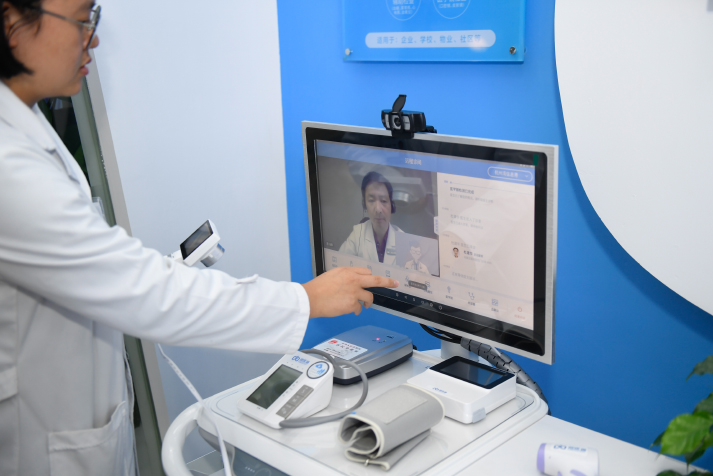Telemedicine development in China
- By Mathew Wong
 0 Comment(s)
0 Comment(s) Print
Print E-mail China.org.cn, August 18, 2022
E-mail China.org.cn, August 18, 2022

Telemedicine refers to the use of telecommunication and information technology to provide clinical healthcare from a distance. This ranges from the remote collection, transmission, processing, storage, and inquiry of medical information to examination, observation, and diagnosis of diseases.
Prior to the COVID-19 pandemic outbreak, people in China usually visited medical institutions for their healthcare needs. However, the concept of telemedicine has become prevalent now that there is a greater demand for receiving healthcare services as well as a simultaneous need to reduce face-to-face contact under social distancing. It has therefore become an ideal means for striking a balance between public health needs during this critical pandemic period.
This development is well supported by the National Health Commission, which advocates for the widespread use of internet-based medical services to minimize movement among the population and reduce the risk of infection during the pandemic. As a result, there has been a drastic surge in the overall user base and engagement on Chinese online medical platforms. There have also been significant promotion and publicity efforts among these platforms to encourage the employment of telemedicine. These platforms have also offered a wide range of healthcare services and products, such as medical consultations, scheduling of hospital appointments, drug prescriptions, and health insurance.
The emergence of telemedicine is helpful for tackling some deep-rooted problems in the healthcare system. Given the ever-increasing demand for healthcare, there are often insufficient healthcare professionals in primary healthcare facilities to cater to the needs of patients. Therefore, telemedicine can now take away some of the basic and mundane tasks from practitioners so that they can have more time and space to serve patients who are in greater need. This can also reduce fatigue and errors due to long working hours and high working pressure among practitioners. Meanwhile, telemedicine also advocates for preventive care, which encourages individuals to stay healthy and reduce the chances of getting sick in the first place.
As telemedicine allows one to receive healthcare services and products without time and space constraints, this can greatly reduce the amount of physical effort and time spent on traveling to and from hospitals and clinics as well as the time spent waiting there to be attended to. This can increase underlying incentives for people to pay more attention to their personal health conditions, such as having regular medical check-ups as prevention or consulting doctors as soon as symptoms emerge. This will be of particular interest to the many people who are too busy with work or reside too far away from healthcare facilities.
With the increase in medical providers offering their services and products online, there will also be an increase in information there too. This is beneficial to patients as they will be more capable of making better-informed decisions by understanding their health as well as being able to compare medical practitioner backgrounds and the cost of medical services. This also presents a situation where different providers will find it imperative to improve their performance and enhance their service quality. All of these factors create a win-win situation for both service providers and customers in the long run.
In 2018, the General Office of the State Council released a forward-looking guideline on the development of the internet plus healthcare, which outlines the framework for integrating internet and information technologies into healthcare for the development of a comprehensive internet healthcare ecosystem. Internet healthcare is also deemed an integral component of the Healthy China 2030 initiative, which aspires to facilitate the country's long-term healthcare development. All of these show the clear stance and strong determination of China to map out the comprehensive and sustainable development of telemedicine in various interrelated dimensions, such as governance and management, resource distribution, strategic and operational planning, and professional capacity building.
However, there is still a lingering concern of a digital divide that hampers vulnerable groups in society from getting access to these healthcare services. It is often important to consider the realistic capacities and capabilities of these groups as they are often of low educational level, from poor economic backgrounds, or have insufficient access to the internet. All of these elements may deprive them of getting access to telemedicine, even though they are also likely to be the most in need of healthcare support. Therefore, more concrete support should be devoted to these disparities to realize full health equity.
Meanwhile, there is always a concern among the public regarding efficacy, safety, and privacy when it comes to the use of telemedicine, which involves a heavy reliance on online technologies and data. Although there are now various quality assurance and monitoring mechanisms in place to safeguard the interests of patients, the government should go further to impose much clearer and more stringent regulations on these service providers, while the service producers should be accountable and transparent in their service provision. All of these are essential to win public support and trust.
While the pandemic has certainly brought significant disruption to our everyday routines, it also simultaneously catalyzed a rethink and re-prioritization of using telemedicine at different levels and across various domains to safeguard public health, especially for vulnerable groups in our society. The benefits and potentials associated with telemedicine can also be further scaled up to other sectors, which are favorable to the long-term development of the healthcare sector.
Mathew Wong is an assistant professor in the Department of Social Sciences at the Education University of Hong Kong.
Opinion articles reflect the views of their authors, not necessarily those of China.org.cn.
If you would like to contribute, please contact us at opinion@china.org.cn.






Go to Forum >>0 Comment(s)